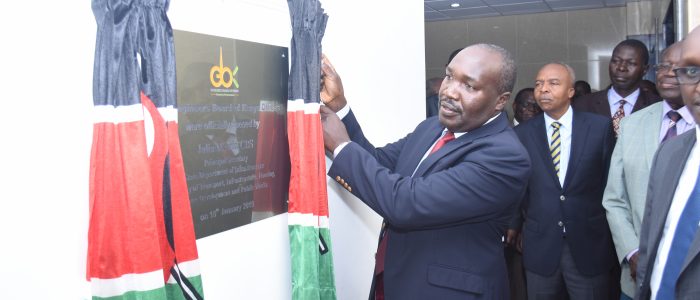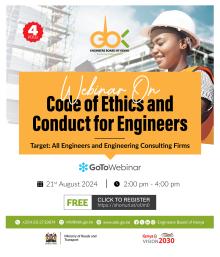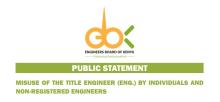EBK Chairman Speech During The Harvesting Blue/Ocean Economy For Accelerated Economic Growth: The Role Of The Engineer Conference
EBK Chairman D.M Wanjau Speech during the ‘Harvesting Blue/Ocean Economy for Accelerated Economic Growth: The Role of The Engineer’ Conference, Mombasa 17-21st September 2018
Distinguished Delegates,
As the chairperson of the Engineers Board of Kenya (EBK), it is my pleasure to welcome you to the 5th African Engineering Week and the 3rd African Engineering Conference. On behalf of EBK, I wish to register my utmost honour in co-hosting this special conference.
I am happy first as an African that we can meet as the people of this continent to discuss on how we can sustainably use the resources at our disposal to achieve economic growth and to improve the livelihoods of our people. Secondly, I am happy as an engineer that this occasion has come at my time. Finally, it is my joy that we are working together to co-host the conference both as the regulators (EBK) and the practitioners who are represented by IEK.
I am privileged to be part of the discussion on the state of the resources in our oceans. Africa is blessed to be surrounded with number of oceans and seas. In particular, our continent neighbours with the Mediterranean Sea to the north, the Suez Canal and the Red Sea to the northeast, the Indian Ocean to the east and southeast, and the Atlantic Ocean to the west. All these are resources that require the skill and professional ethics of engineers to harness sustainably for the benefit of the people of this continent.
I take this opportunity thank the World Federation of Engineering Organizations (WFEO), the Federation of African Engineering Organizations (FAEO) and UNESCO who supported this conference to be hosted in Kenya at this time. Furthermore, the theme of the conference, which is – Harvesting Blue/Ocean Economy for Accelerated Economic Growth: The Role of The Engineer, is closely related to many pillars of the economic blueprint of our country.
For instance, we are currently implementing Lamu Port, South Sudan, Ethiopia Transport Corridor (LAPSSET) project which aims at building infrastructure to link the new port of Lamu in Kenya to Juba in South Sudan and Addis Ababa in Ethiopia. The successful completion of this project is going to create new opportunities through which we can harness the ocean resources for the benefit of the countries involved in the project.
It is therefore important that our engineers are adequately prepared though training and through the necessary regulations to anticipate the opportunities that are going to emerge from the latest global interest in the blue economy. It is my hope that our engineers will gain lessons from variety of papers that will be presented in this conference.
In appreciation of the important role that engineers continue to play in promoting economic growth and aiding the development of our country, the EBK was established as a legal institution through the Engineers Act 2011 to regulate engineering practice in Kenya. Apart from regulation, the board is mandated to champion the development of the engineering profession by promoting capacity building and training of engineers, registration and regulation of their conduct for improved performance of the profession.
Today we are proud to have more than 10,000 engineers in Kenya who are registered with the board. The engineers in Kenya are well trained, talented and experienced in the different engineering disciplines. It is therefore my pleasure that we have this conference for our engineers to come and share with the world the output of their work and similarly, to network, learn of new techniques and trends from engineers from across Africa and the world.
I chair a board whose aim is to ensure that the engineers who graduate from our universities are competent and able to meet the current demands of our country and continent. Secondly, my board works with the engineers to ensure that they carry out their work with the utmost level of professional ethics and to keep to the ideals of the profession.
Currently, we are proud to be working closely with other government agencies to meet the objectives of Vision 2030 economic blueprint. In the blueprint, the Kenya government aims at being a globally competitive and prosperous country by the year 2030. To this end, infrastructure is considered as an enabler for economic growth. To facilitate infrastructure development, engineers play a critical role in the core pillars of manufacturing, energy development, science, technology and innovations, transport, fisheries among other areas.
At EBK, we understand that the success of the blueprint will depend on the effectiveness of the engineering profession and on having an enabling environment where our engineers can freely practice their trade. We have therefore developed a comprehensive strategic plan to guide our work and to ensure that engineering services are efficiently and effectively rendered.
Apart from the Vision 2030 blueprint, we at the EBK are working hand in hand with other agencies in Kenya to achieve the national government’s 4-pillar strategy for the economy. The specific pillars are food security, universal health care, manufacturing and affordable shelter. In line with the themes of these conference, we see very close links between the four pillars and the blue economy particular in the areas of fisheries development and manufacturing particularly in regards to offshore energy potential, marine transport and mining.
This conference therefore provides a good avenue for our engineers to network with other engineers and to learn from the best practices across the continent. In addition, since we share the oceans as the people in this continent, this conference provides a good opportunity for us to discuss on common standards that we can adopt to ensure mutual working relationships between engineers from different parts of the continent.
Further, as the chairperson of the regulatory body of the engineering profession in Kenya, our role is in creating an enabling environment for engineers from our countries to collaborate without unnecessary bottlenecks. The role of engineers in this case will be to brainstorm on the possible hurdles that may hinder the practice of engineering profession within our shared waters. In addition, this conference also provides opportunities for our engineers to discuss on the potential gaps in capacity within our countries and to identify engineers in other countries that can provide the much needed capacity and training.
As practitioners and regulators, we must use this occasion to brainstorm on enabling laws that can promote the growth of the engineering profession within this relatively new area of application in our continent. Lastly, for sustainability, we must ensure that engineering projects within the marine environment are safe, efficient and promote the conservation of nature.
“The oceans are not exclusive domains of engineers, we, as engineers must also think of how we are going to interact with other sector players in the oceans ecosystem, only then will we have sustainable innovations that protect our ecosystem”
Welcome to Kenya.
Eng. D M. Wanjau, PE
Chairman of Engineers Board of Kenya



